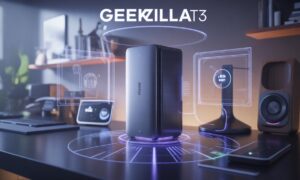Samsung Electronics said yesterday that it anticipated the demand for artificial intelligence to remain high in the second half, propelling sales of memory chips and electronic devices, as it announced a more than ten-fold increase in first-quarter operating profit.
TakeAway Points:
- Samsung Electronics said yesterday that it anticipated the demand for artificial intelligence to remain high in the second half, propelling sales of memory chips and electronic devices.
- The company also announced a more than ten-fold increase in first-quarter operating profit.
- However, rival South Korean company SK Hynix stated last week that it anticipated a complete recovery in the memory chip industry due to AI demand.
SamSung Electronics Profit Surges
Due to the surge in artificial intelligence, the South Korean company’s memory chip sales nearly doubled in the first quarter compared to the same period last year, as prices climbed sharply from a deep decline.
“In the second half of 2024, business conditions are expected to remain positive, with demand – mainly around generative AI – holding strong, despite continued volatility relating to macroeconomic trends and geopolitical issues,” Samsung said in a statement.
During morning trading, Samsung shares saw a 1.6% increase, surpassing a 0.5% increase in South Korea’s benchmark index (.KS11).
The largest memory chip and television manufacturer in the world reported that operating profit increased to 6.6 trillion won ($4.8 billion) from January to March of last year from 640 billion won the previous year.
That was consistent with Samsung’s own estimate of 6.6 trillion won, which the company had disclosed earlier this month and which represented its largest operational profit since 2022’s third quarter.
The company reported that first-quarter revenue increased 13% to 71.9 trillion won, with a 96% increase in memory chip revenue to 17.49 trillion won.
It solidified the comeback from an unparalleled decline in memory chips brought on by the lacklustre post-pandemic demand for semiconductor-based devices.
PROFIT FROM MEMORY CHIP
A year ago, Samsung’s cash cow industry, the semiconductor division, accounted for two-thirds of the company’s operational profit. However, in the March quarter, the division turned a profit of 1.91 trillion won, up from a loss of 4.58 trillion won the previous year.
Customers buying memory chips in anticipation of future price increases caused Samsung’s memory chip unit to record a profit for the first time since the third quarter of 2022.
According to data provider TrendForce, the cost of DRAM chips, which are used in tech gadgets, climbed by roughly 20% during the first quarter compared to the previous quarter, while the cost of NAND flash chips, which are used to store data, jumped by 23% to 28%.
Rival South Korean company SK Hynix (000660.KS), which reported its largest profit in almost two years, stated last week that it anticipated a complete recovery in the memory chip industry due to AI demand.
In an attempt to capitalise on the AI boom that has helped its competitors, Samsung announced that it has started mass producing the newest high bandwidth memory (HBM) chips, known as 8-layer HBM3E, for use in generative AI chipsets this month.
The 12-layer version is expected to be produced beginning in the second quarter, according to the statement.
In the first quarter, Samsung’s mobile devices division reported an operating profit of 3.51 trillion won, which is less than the 3.94 trillion won it made in the same period last year. The company’s flagship Galaxy S24 handsets, which were released during the quarter, had a decline in profit due to rising expenses, particularly higher memory chip pricing.



































